Voice of BBC Scotland's Home of the Year Anne McAlpine invites us into her home
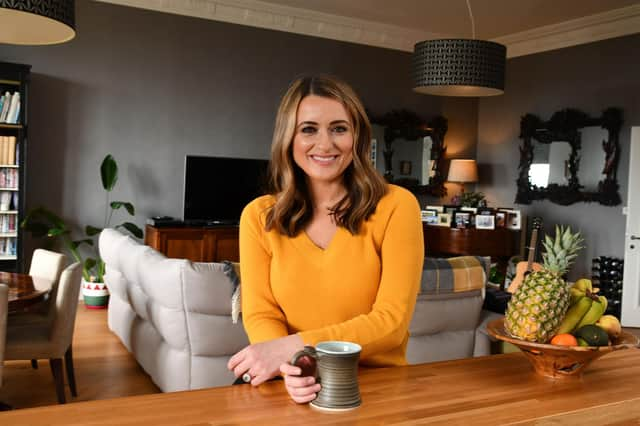

Bored with staring at our own four walls during lockdown, as a nation we’re hooked on BBC Scotland’s Scottish Home of the Year and the opportunity to have a good nosey around other people’s pads. From the Highlands to the Borders to the Islands, whether it’s a shiny smart home with the latest tech, a couthie cottage with tardis interior or an indulgent abode where gold bath tubs and chandeliers dazzle the eye, try holding us back as we race over the thresholds at the invitation of the proud owners.
Leading us on is Anne McAlpine, the Scottish broadcaster and voice of the show, familiar to us all from BBC Scotland and BBC Alba, presenting late night Reporting Scotland, the farming and countryside show Landward, as well as a Gaelic radio drivetime show. Over the threshold into family rooms, dream kitchens, bedrooms and bathrooms in the bid to discover what makes Scotland’s top home. Nosey? Not at all, we’ve been invited.
Hailing from Lewis in the Outer Hebrides, 35-year-old McAlpine [formerly Lundon] grew up speaking Gaelic and English on an island where dropping into other people’s homes was a way of life and the show is a great fit for someone who admits she’s always been intrigued by other people’s property.
“My mother says when I was younger and we were visiting people I always used to want to go to the bathroom at some point, regardless of whether I actually needed the toilet or not, just so I could have a nosey.” She laughs. “I wasn’t going through the cupboards or anything! I was just curious.”
She doesn’t need to explain. We’re with her after two years with barely an invite, never mind the chance to indulge in a few hours of home envy.
“Yes, SHOTY is a good one for that and the first series was at the height of lockdown so everyone was locked in their own home so it was a bit of escapism being inside other people’s.”
“I think it’s interesting to see how people style their own homes and the kind of houses people have all around the country.”
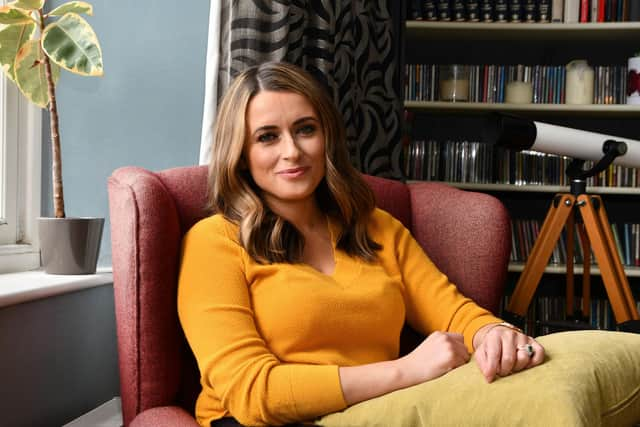

“I think I probably have always been into houses. Where I’m from in the Islands most people live in detached homes and a lot of people build their own homes so I have always liked seeing what people can do. Also the show demonstrates that you don’t have to have loads of money to be creative. At one end of the spectrum someone’s built an absolute mansion and then you’ll have someone who has been very creative with the space they’ve got and both can be homely and beautiful.”
Today McAlpine lives in a flat in the West End of Glasgow, a converted sandstone villa overlooking Kelvingrove Park, that was once halls of residence for Glasgow University, with cameraman husband Ken who she met at work and married in February.
“We have one big open plan room and because we’re on the second floor it has big windows that let in a lot of natural light and it has a really great view. I think that’s one of my favourite things about living here. Being able to look out and see for miles, over Kelvingrove Park and Glasgow University and beyond towards the hills.”
“I would say it’s very homely. I think the open plan setting is very welcoming for entertaining and you can cook and have your guests all in the same room. My husband lived here on his own before we were together so it was a bit of a bachelor pad, and I have slowly put my own stamp on it. I thought he was quite resistant to change but actually he wasn’t. The sofa’s different, definitely. He had two and there wasn’t anything wrong with them, they were just very mismatched. I have a thing about symmetry and matching furniture. I’ve just slowly changed a few things. And my niece Erin did a painting for us as a wedding present that I’ve just put up on the wall and that has quite bold colours, oranges, so I think that works nicely.”
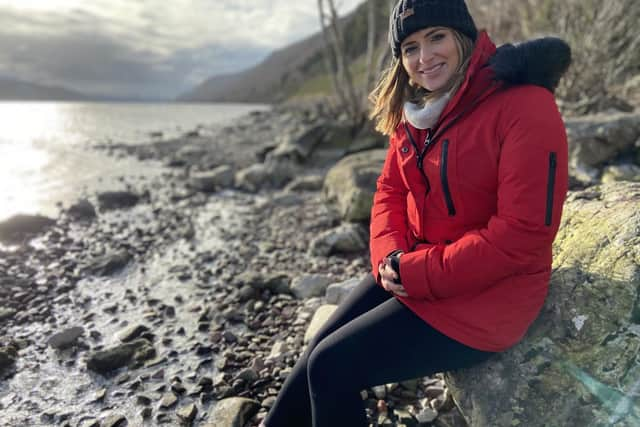

While many people turned to DIY during lockdown the McAlpines creative cravings saw them buy a piano.
“It sounds indulgent, but a second hand baby grand, and it was probably the best thing we’ve ever bought. One of us plays it every day. My husband was a musician in a former life - in a band called The Supernaturals - and he’s loving playing again. I play a bit of Adele, Coldplay, some Beatles, a bit of a mish-mash. It’s great.”
McAlpine has always been musical and played the chanter and bagpipes, but a bike crash when she was 14 damaged her mouth “so that was the end of that” but she’d always liked to tinker on pianos.
“We’d enquired about getting one before but when we said we live on the second floor the conversation would always be cut short. But the guy we bought this from knew who to contact and six people got it up the stairs. I’m told it’s actually easier to transport a baby grand because you can take the legs off and then it goes on its side. Now we’ve got all our family photographs on it and I can’t remember the room without it. It looks like it’s always been there. It fits perfectly.”
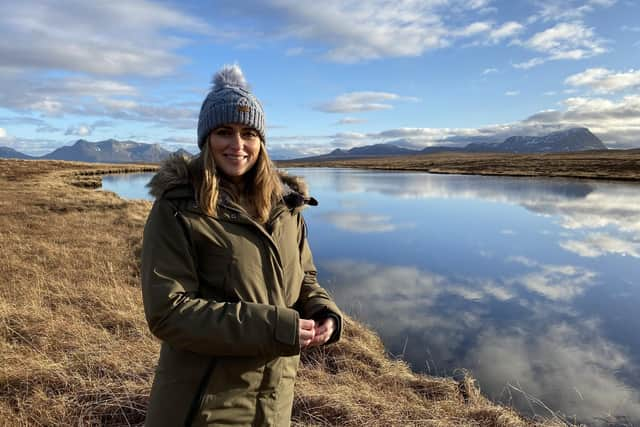

So is the piano the place where, SHOTY-style, the big red heart would be placed to indicate her favourite spot in the home?
“I think so because it’s got all our family pictures on it and it’s in the corner so you can see over into the kitchen or to the couch and out of the window and into the distance.”
But also close to McAlpine’s heart are the chairs covered in tweed that sit at the window with views of the Park and bring a flavour of the Islands into the home.
“They’re old wing-backed chairs, one was bought by my dad at an auction for a £1. My aunty bought some Harris Tweed for me and I sent them up to a guy in Scalpay to re-upholster because my dad’s back and forward with a van to Glasgow. They’re getting a bit faded and look a bit tired - one is a bluey, greeny, turquoise and the other’s red. Clashing colours, but they’re cute. I like them.”
There’s a third Harris Tweed chair in the bedroom, the room that’s been given the most attention, with Anne inspired by SHOTY go “a bit bolder” with paint in a shade of teal.
“That’s on the wall and we’ve got a bit of artwork and lots of plants that I’m trying to keep alive. The only work we’ve ever had done is in here, building fitted wardrobes and a chest. Storage is a bit of an issue in this house. I don’t think it was a woman who did the design when the house was getting broken up into flats,” she laughs. “So we needed wardrobe space in the bedroom and of course my husband has got hardly any of it. It’s mostly my stuff! I have a lot of clothes and shoes.”
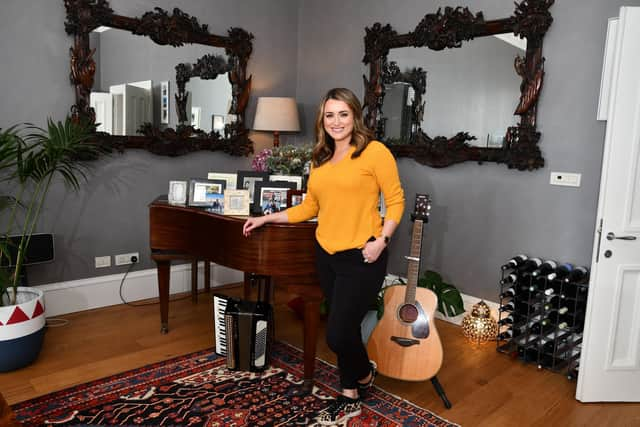

Which is fair enough as appearances on the news call for more than joggers and hoodies.
“Exactly, and I need a lot of options,” she laughs.
There’s also an essential collection of practical outdoorwear for Landward purposes, mostly kept in the boot of the car.
“I like that old saying, ‘there’s no such thing as bad weather, it’s just bad clothes. Prepare for all seasons. I’ve got all sorts of different outdoor weather gear in the boot of my car. It’s like a wardrobe in there as well. I actually really like how we have different seasons here. I don't think I could live somewhere where it’s sunny all the time.”
Work has taken McAlpine around Scotland filming Landward for BBC Scotland and The Rain and The Minch series for BBC Alba and during lockdown the couple were able to keep filming for since they were in the same household and have a lot of the kit required.
“We’ve done a few BBC Alba series together too and a lot of people ask what’s that like, working together but it just feels normal. I think we work very well together. We don’t fall out - he’s very relaxed.
“And we get out and about together. The best thing about working on a programme like Landward is getting out into rural Scotland and hearing people’s stories and showcasing the best of what Scotland has to offer. You meet some really interesting people you wouldn't ordinarily come across and they’re very accommodating in telling you their story and letting you into their lives and homes.”
Landward also gives McAlpine the opportunity to return to the Hebrides occasionally to film.
“One of my favourite experiences on Landward was on Raasay, making a piece about Sorley MacLean the Gaelic poet. Being where he was from was quite an amazing experience and we walked to Hallaig which is the subject of one of his most famous pieces of writing. It’s an old township, which was a bit of a hike actually, and it was really peaceful and beautiful. It was just quite an amazing place and I’ve never really been anywhere quite like it.”
How does her Glasgow home differ from the one she grew up in on the outskirts of Stornoway?
“It’s quite different. It’s a flat and we lived in a house. I have three older sisters so it was quite a different space, quite a busy house. Here, we work away quite a lot and when we do have people over it’s for dinner or that kind of thing. People pop into your house all the time in the Hebrides. If someone popped in her unannounced, I would think oh my goodness the place is a mess.”
You can take the girl out of the Islands but you can’t take the Islands out of the girl and McAlpine goes back as often as she can.
“I was lucky that I was filming during the pandemic so got back quite a lot and I’ve been back home already twice this year and am going in July. My husband was brought up just outside Largs but loves the Islands and travelling as well. I think both of us are probably quite surprised that we’re still living in a city. We’re the kind of people that would to be out there in the sticks somewhere.”
It’s true, apart from seeing her reading the news, we’re accustomed to seeing McAlpine striding along shorelines or up a hill, battling wind and rain.
“I know. I think people are surprised I’m here, that I live in the city. I didn’t expect to still be here myself to be honest. I moved to Glasgow a long time ago for work, and I thought och, I’ll be just here for a wee while and I used to go home as often as I could. Any time that I had I was always at home, and I still call it home, you know. But yeah, here I am.”
“I love Glasgow. It took me a long time to settle and it was a bit of a change but once I did settle, I think it’s the kind of place that you do consider home for now.”
Ideally, if McAlpine didn’t have to be Glasgow-based for work, she’d go for somewhere “pretty remote, with loads of land, maybe a smallholding with some cows, near the sea somewhere. Anywhere on the west coast of Scotland, in the middle of nowhere, where there’s not a soul for miles.”
Describing herself on her Twitter handle as That Teuchter off the telly, McAlpine’s Hebridean accent is a refreshing change from the monotony of Central Belt accents and apposite as the show travels the length and breadth of the country.
“I’ve got a very Scottish accent. I know it’s off beat and all, but I think it’s important to have all of Scotland represented in the media. It used to be a time when it was very Central Belt and London-based accents but I think it’s becoming more commonplace to have regional accents on more mainstream programming which is a good thing.”
“A lot of people think teuchter is a derogatory term but I don’t think it is. I AM a teuchter so, you know… It’s just what I am. I get lots of criticism for my accent but I don’t really care. I just let it wash over me. A man once came up to me in a bar to tell me his wife really didn’t like my accent, thought it was too ‘put on’.” She laughs. “But I really don’t care if people don’t like my accent. It’s just the way I speak and it’s just part of who you are and it’s a link to where you’re from as well which is a big part of your identity. Ao, you know, so stuff them I say.”
Where you’re from and identity have always been a big part of McAlpine’s life and career, taking her into broadcasting after a degree in Gaelic language and culture at the University of the Highlands & Islands. Aiming to be a Gaelic newsreader she contributed to De a-Nis and worked with an independent media company in Glasgow after graduation, then with the emergence of BBC Alba she became a presenter on Eorpa, its European current affairs programme and then on to BBC Scotland, with Reporting Scotland and Landward.
When we’re talking about McAlpine’s BBC Alba show Rain, I ask her if there are lots of words in Gaelic for rain, to which the answer is yes, there are many ways of describing it, and she goes on to talk about her first language.
“Gaelic is a beautiful language actually. I could wax lyrical about it all day. A lot of time for a word in Gaelic there isn’t an English equivalent, so you’re maybe saying a sentence to describe one word in Gaelic. And there are a lot of different ways of saying things. For example, love, there are loads of different words for love that you can use, because it’s a very romantic language. I’m going a bit off topic here but I just thought this was really beautiful, the word ‘honeymoon’, a direct translation from Gaelic to English if you were going to be literal is ‘month of the kisses’, which I always thought was really cute. And then none after that, obviously,” she laughs. “There’s a lot of old poetry and love songs in Gaelic. It’s a very romantic language.”
Which brings us to the location of her own “month of the kisses”, where did that take place?
She laughs. “Venice. I had only ever been to Italy for work, on Eorpa, but never to Venice. I was always putting in story ideas and the producer was like ‘are you still banging on about Venice? And I’d say ‘it’s a great story, we need to go’ but I didn’t manage until the honeymoon. It was wonderful. I loved it. It was before all their festivals start and really quiet as it was still a bit of a faff to travel, with testing. There weren’t that many tourists, so it was perfect. I remember walking home one evening to our hotel and there wasn’t a soul in St Mark’s Square. It was perfect. We have some lovely photos from there.”
Perfect to display on top of a baby grand in the place that Anne McAlpine calls home.
Scotland’s Home of the Year - Mondays at 8.30pm on BBC One Scotland and Wednesdays at 8.00pm on the BBC Scotland channel. Also on BBC iPlayer.